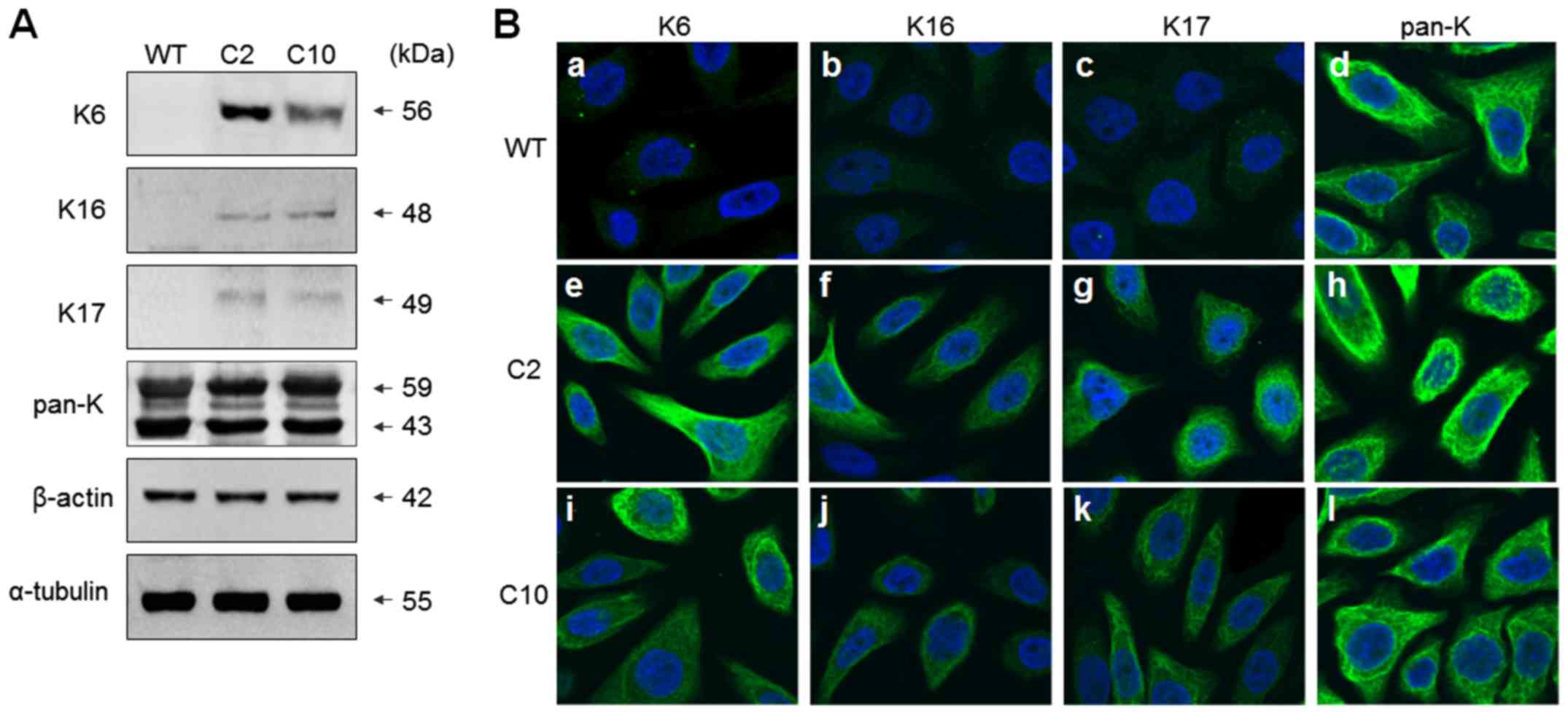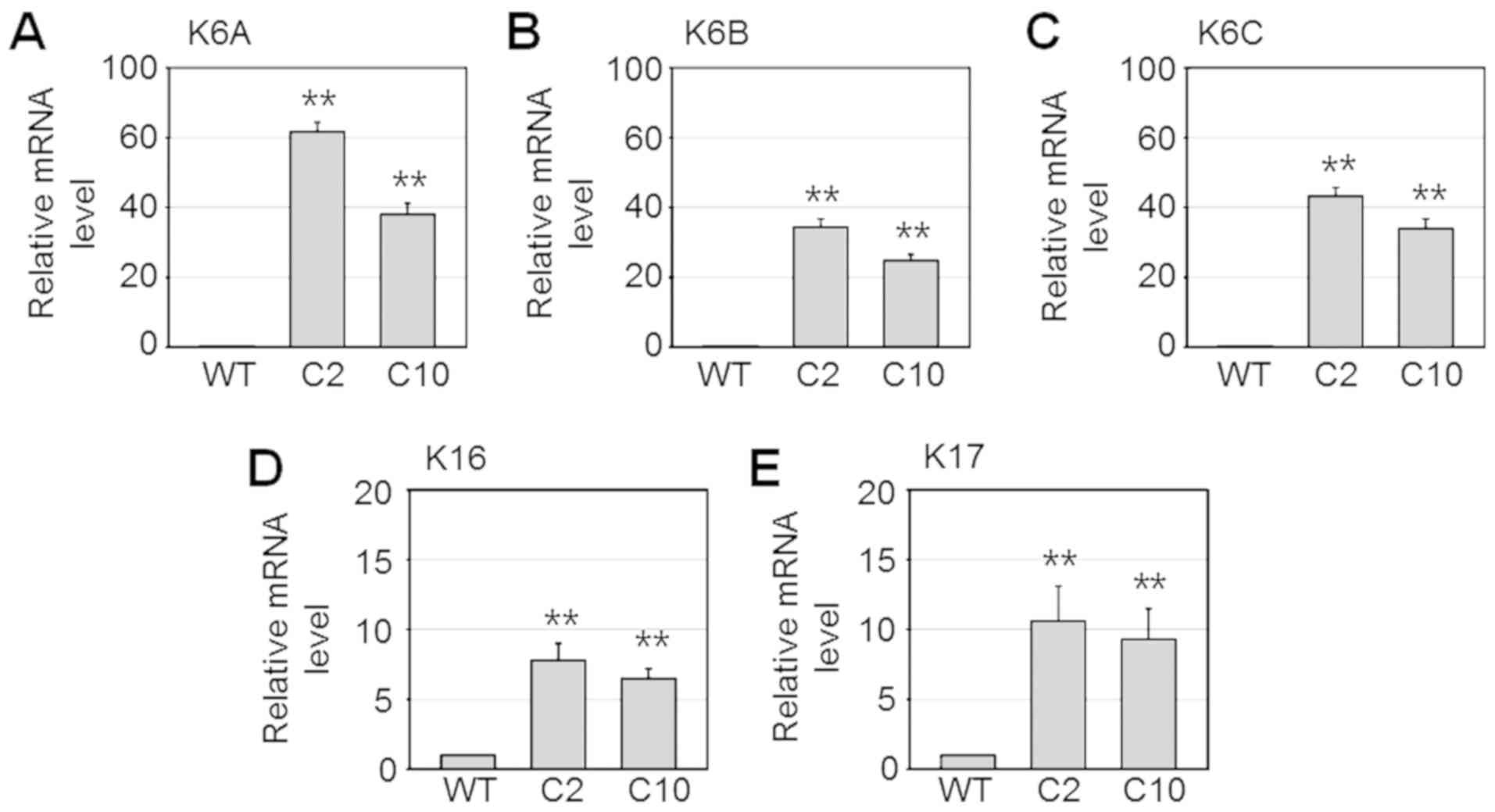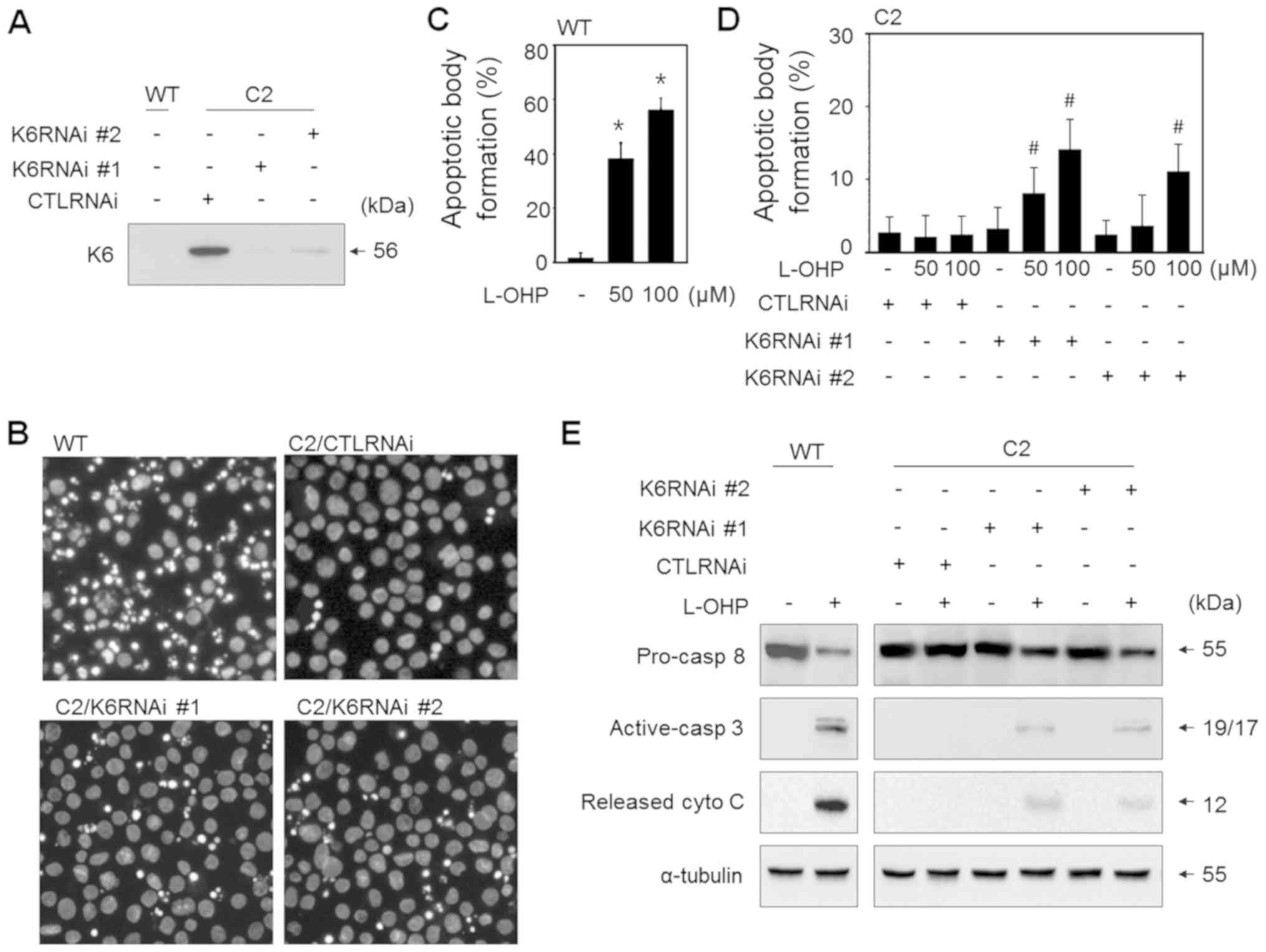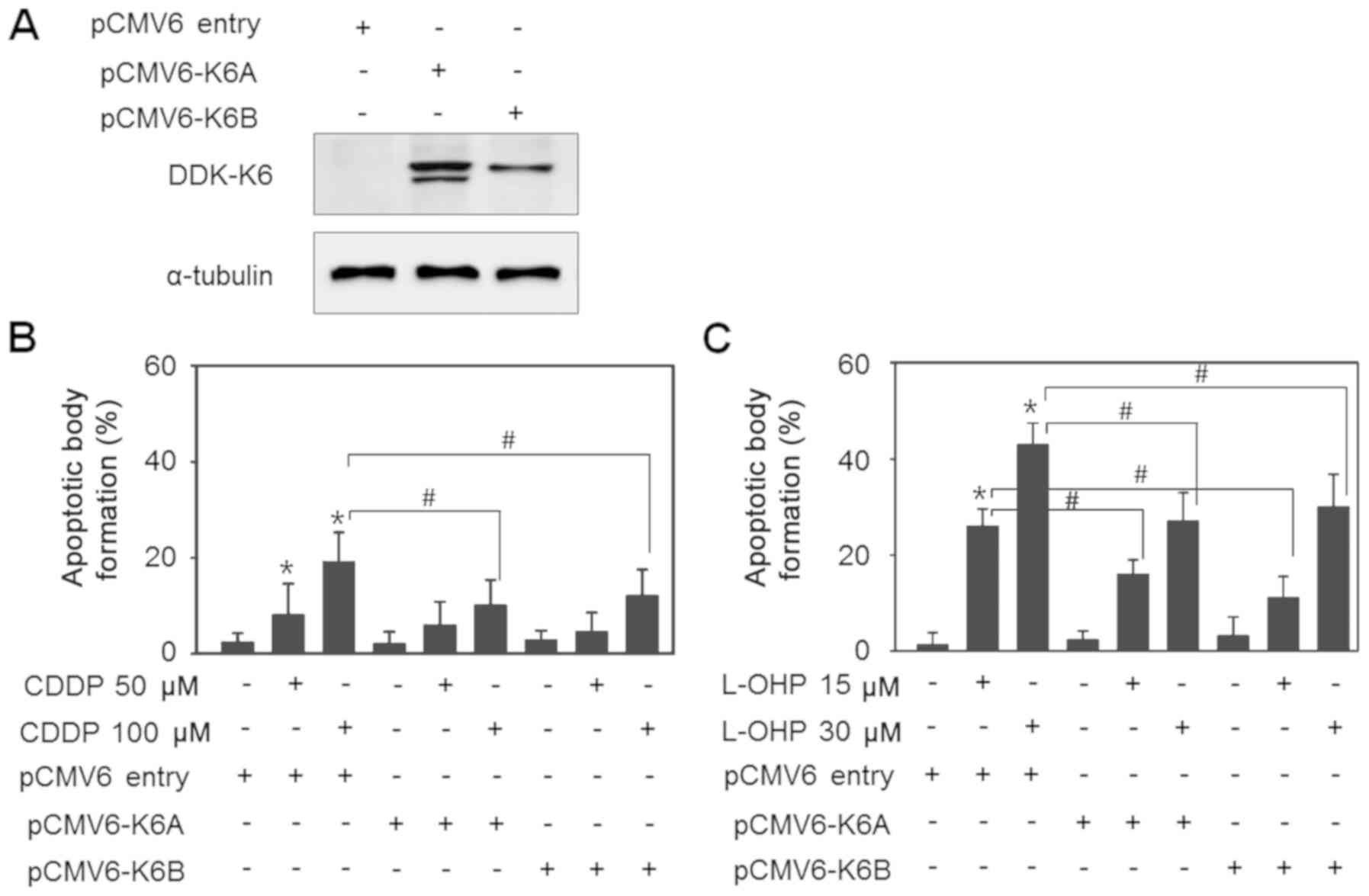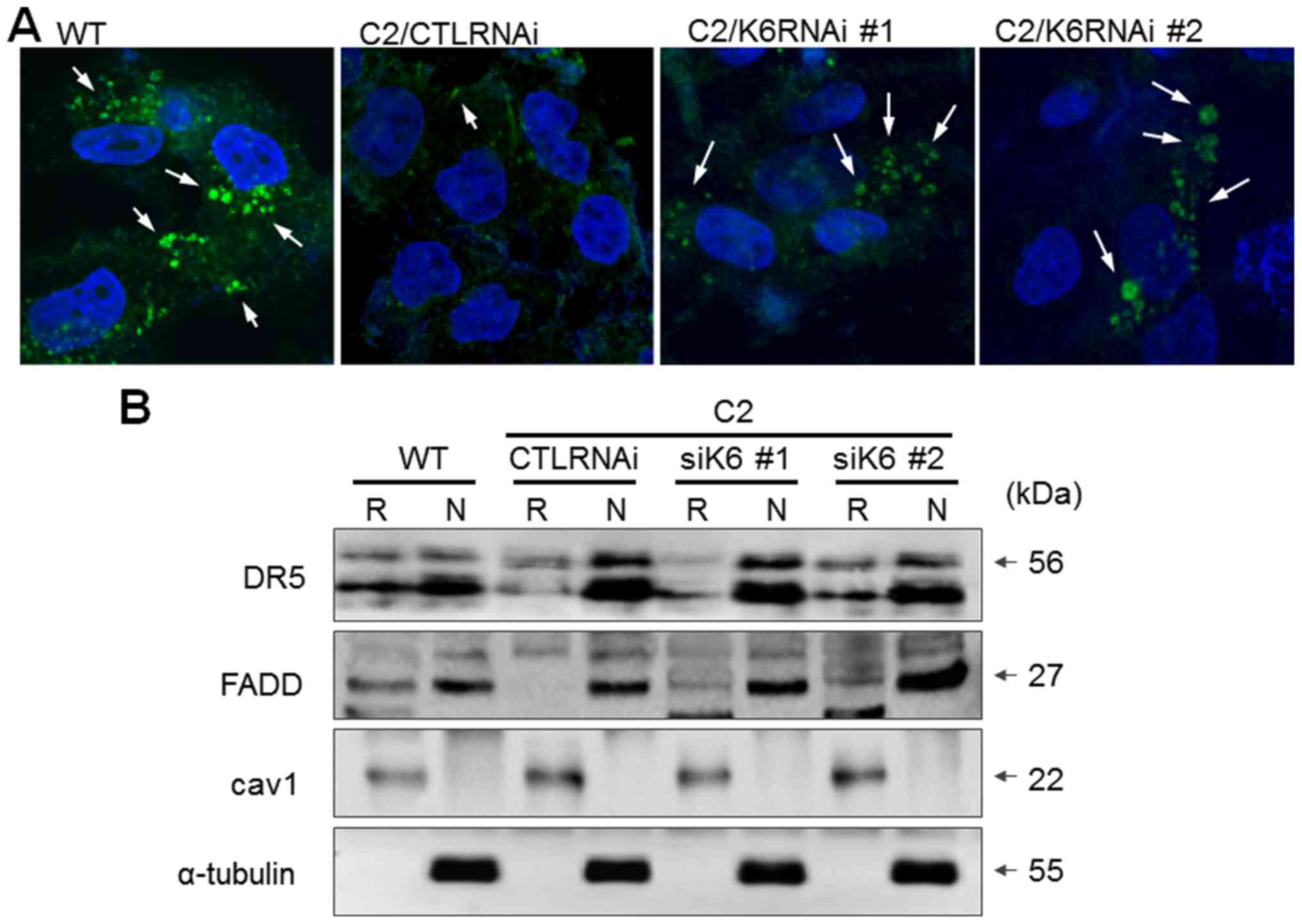|
1
|
Komatsu M, Sumizawa T, Mutoh M, Chen ZS,
Terada K, Furukawa T, Yang XL, Gao H, Miura N, Sugiyama T and
Akiyama S: Copper-transporting P-type adenosine triphosphatase
(ATP7B) is associated with cisplatin resistance. Cancer Res.
60:1312–1316. 2000.PubMed/NCBI
|
|
2
|
Cort A, Ozben T, Saso L, De Luca C and
Korkina L: Redox control of multidrug resistance and its possible
modulation by antioxidants. Oxid Med Cell Longev. 2016:42519122016.
View Article : Google Scholar : PubMed/NCBI
|
|
3
|
Wang J, Zhou JY and Wu GS: ERK-dependent
MKP-1-mediated cisplatin resistance in human ovarian cancer cells.
Cancer Res. 67:11933–11941. 2007. View Article : Google Scholar : PubMed/NCBI
|
|
4
|
Islam SU, Shehzad A, Sonn JK and Lee YS:
PRPF overexpression induces drug resistance through actin
cytoskeleton rearrangement and epithelial-mesenchymal transition.
Oncotarget. 8:56659–56671. 2017. View Article : Google Scholar : PubMed/NCBI
|
|
5
|
Foerster F, Braig S, Moser C, Kubisch R,
Busse J, Wagner E, Schmoeckel E, Mayr D, Schmitt S, Huettel S, et
al: Targeting the actin cytoskeleton: Selective antitumor action
via trapping PKCvarepsilon. Cell Death Dis. 5:e13982014. View Article : Google Scholar : PubMed/NCBI
|
|
6
|
Mukhtar E, Adhami VM and Mukhtar H:
Targeting microtubules by natural agents for cancer therapy. Mol
Cancer Ther. 13:275–284. 2014. View Article : Google Scholar : PubMed/NCBI
|
|
7
|
Xi J, Zhu X, Feng Y, Huang N, Luo G, Mao
Y, Han X, Tian W, Wang G, Han X, et al: Development of a novel
class of tubulin inhibitors with promising anticancer activities.
Mol Cancer Res. 11:856–864. 2013. View Article : Google Scholar : PubMed/NCBI
|
|
8
|
Moll R, Divo M and Langbein L: The human
keratins: Biology and pathology. Histochem Cell Biol. 129:705–733.
2008. View Article : Google Scholar : PubMed/NCBI
|
|
9
|
Moll R, Franke WW, Schiller DL, Geiger B
and Krepler R: The catalog of human cytokeratins: Patterns of
expression in normal epithelia, tumors and cultured cells. Cell.
31:11–24. 1982. View Article : Google Scholar : PubMed/NCBI
|
|
10
|
Fuchs E: Keratins and the skin. Annu Rev
Cell Dev Biol. 11:123–153. 1995. View Article : Google Scholar : PubMed/NCBI
|
|
11
|
Coulombe PA and Omary MB: ‘Hard’ and
‘soft’ principles defining the structure, function and regulation
of keratin intermediate filaments. Curr Opin Cell Biol. 14:110–122.
2002. View Article : Google Scholar : PubMed/NCBI
|
|
12
|
Galvin S, Loomis C, Manabe M, Dhouailly D
and Sun TT: The major pathways of keratinocyte differentiation as
defined by keratin expression: An overview. Adv Dermatol.
4:277–300. 1989.PubMed/NCBI
|
|
13
|
Van Muijen GN, Warnaar SO and Ponec M:
Differentiation-related changes of cytokeratin expression in
cultured keratinocytes and in fetal, newborn, and adult epidermis.
Exp Cell Res. 171:331–345. 1987. View Article : Google Scholar : PubMed/NCBI
|
|
14
|
Gilbert S, Loranger A and Marceau N:
Keratins modulate c-Flip/extracellular signal-regulated kinase 1
and 2 antiapoptotic signaling in simple epithelial cells. Mol Cell
Biol. 24:7072–7081. 2004. View Article : Google Scholar : PubMed/NCBI
|
|
15
|
Roux A, Loranger A, Lavoie JN and Marceau
N: Keratin 8/18 regulation of insulin receptor signaling and
trafficking in hepatocytes through a concerted
phosphoinositide-dependent Akt and Rab5 modulation. FASEB J.
31:3555–3573. 2017. View Article : Google Scholar : PubMed/NCBI
|
|
16
|
Lahdeniemi IAK, Misiorek JO, Antila CJM,
Landor SK, Stenvall CA, Fortelius LE, Bergström LK, Sahlgren C and
Toivola DM: Keratins regulate colonic epithelial cell
differentiation through the Notch1 signalling pathway. Cell Death
Differ. 24:984–996. 2017. View Article : Google Scholar : PubMed/NCBI
|
|
17
|
Srivastava SS, Alam H, Patil SJ,
Shrinivasan R, Raikundalia S, Chaudhari PR and Vaidya MM: Keratin
5/14mediated cell differentiation and transformation are regulated
by TAp63 and Notch1 in oral squamous cell carcinomaderived cells.
Oncol Rep. 39:2393–2401. 2018.PubMed/NCBI
|
|
18
|
Chivu-Economescu M, Dragu DL, Necula LG,
Matei L, Enciu AM, Bleotu C and Diaconu CC: Knockdown of KRT17 by
siRNA induces antitumoral effects on gastric cancer cells. Gastric
Cancer. 20:948–959. 2017. View Article : Google Scholar : PubMed/NCBI
|
|
19
|
Xu H, Choi SM, An CS, Min YD, Kim KC, Kim
KJ and Choi CH: Concentration-dependent collateral sensitivity of
cisplatin-resistant gastric cancer cell sublines. Biochem Biophys
Res Commun. 328:618–622. 2005. View Article : Google Scholar : PubMed/NCBI
|
|
20
|
Livak KJ and Schmittgen TD: Analysis of
relative gene expression data using real-time quantitative PCR and
the 2(-Delta Delta C(T)) method. Methods. 25:402–408. 2001.
View Article : Google Scholar : PubMed/NCBI
|
|
21
|
Iwasaki I, Sugiyama H, Kanazawa S and
Hemmi H: Establishment of cisplatin-resistant variants of human
neuroblastoma cell lines, TGW and GOTO, and their drug
cross-resistance profiles. Cancer Chemother Pharmacol. 49:438–444.
2002. View Article : Google Scholar : PubMed/NCBI
|
|
22
|
Sun CL and Chao CC: Cross-resistance to
death ligand-induced apoptosis in cisplatin-selected HeLa cells
associated with overexpression of DDB2 and subsequent induction of
cFLIP. Mol Pharmacol. 67:1307–1314. 2005. View Article : Google Scholar : PubMed/NCBI
|
|
23
|
Xu L, Qu X, Zhang Y, Hu X, Yang X, Hou K,
Teng Y, Zhang J, Sada K and Liu Y: Oxaliplatin enhances
TRAIL-induced apoptosis in gastric cancer cells by CBL-regulated
death receptor redistribution in lipid rafts. FEBS Lett.
583:943–948. 2009. View Article : Google Scholar : PubMed/NCBI
|
|
24
|
Huang CR, Jin ZX, Dong L, Tong XP, Yue S,
Kawanami T, Sawaki T, Sakai T, Miki M, Iwao H, et al: Cisplatin
augments FAS-mediated apoptosis through lipid rafts. Anticancer
Res. 30:2065–2071. 2010.PubMed/NCBI
|
|
25
|
Rothnagel JA, Seki T, Ogo M, Longley MA,
Wojcik SM, Bundman DS, Bickenbach JR and Roop DR: The mouse keratin
6 isoforms are differentially expressed in the hair follicle,
footpad, tongue and activated epidermis. Differentiation.
65:119–130. 1999. View Article : Google Scholar : PubMed/NCBI
|
|
26
|
Wong P and Coulombe PA: Loss of keratin 6
(K6) proteins reveals a function for intermediate filaments during
wound repair. J Cell Biol. 163:327–337. 2003. View Article : Google Scholar : PubMed/NCBI
|
|
27
|
Jiang CK, Magnaldo T, Ohtsuki M, Freedberg
IM, Bernerd F and Blumenberg M: Epidermal growth factor and
transforming growth factor alpha specifically induce the
activation- and hyperproliferation-associated keratins 6 and 16.
Proc Natl Acad Sci USA. 90:6786–6790. 1993. View Article : Google Scholar : PubMed/NCBI
|
|
28
|
Leigh IM, Navsaria H, Purkis PE, McKay IA,
Bowden PE and Riddle PN: Keratins (K16 and K17) as markers of
keratinocyte hyperproliferation in psoriasis in vivo and in vitro.
Br J Dermatol. 133:501–511. 1995. View Article : Google Scholar : PubMed/NCBI
|
|
29
|
Gilbert S, Loranger A, Daigle N and
Marceau N: Simple epithelium keratins 8 and 18 provide resistance
to Fas-mediated apoptosis. The protection occurs through a
receptor-targeting modulation. J Cell Biol. 154:763–773. 2001.
View Article : Google Scholar : PubMed/NCBI
|
|
30
|
Bauman PA, Dalton WS, Anderson JM and
Cress AE: Expression of cytokeratin confers multiple drug
resistance. Proc Natl Acad Sci USA. 91:5311–5314. 1994. View Article : Google Scholar : PubMed/NCBI
|
|
31
|
Anderson JM, Heindl LM, Bauman PA, Ludi
CW, Dalton WS and Cress AE: Cytokeratin expression results in a
drug-resistant phenotype to six different chemotherapeutic agents.
Clin Cancer Res. 2:97–105. 1996.PubMed/NCBI
|
|
32
|
Wang Y, He QY, Tsao SW, Cheung YH, Wong A
and Chiu JF: Cytokeratin 8 silencing in human nasopharyngeal
carcinoma cells leads to cisplatin sensitization. Cancer Lett.
265:188–196. 2008. View Article : Google Scholar : PubMed/NCBI
|
|
33
|
Ricciardelli C, Lokman NA, Pyragius CE,
Ween MP, Macpherson AM, Ruszkiewicz A, Hoffmann P and Oehler MK:
Keratin 5 overexpression is associated with serous ovarian cancer
recurrence and chemotherapy resistance. Oncotarget. 8:17819–17832.
2017. View Article : Google Scholar : PubMed/NCBI
|
|
34
|
Gilbert S, Loranger A, Lavoie JN and
Marceau N: Cytoskeleton keratin regulation of FasR signaling
through modulation of actin/ezrin interplay at lipid rafts in
hepatocytes. Apoptosis. 17:880–894. 2012. View Article : Google Scholar : PubMed/NCBI
|
|
35
|
Gilbert S, Loranger A, Omary MB and
Marceau N: Keratin impact on PKCδ- and ASMase-mediated regulation
of hepatocyte lipid raft size-implication for FasR-associated
apoptosis. J Cell Sci. 129:3262–3273. 2016. View Article : Google Scholar : PubMed/NCBI
|















